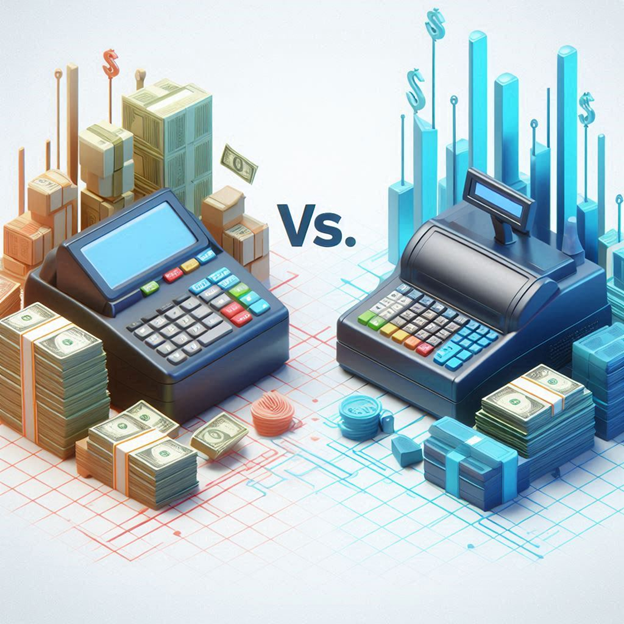Efficiency and customer satisfaction are key factors that businesses must prioritize when selecting a transaction processing system. The debate between traditional cash registers and modern POS systems is a common one, with each offering distinct advantages that can have a significant impact on the overall success of a business.
In this article we’ll find out the key differences between a cash register vs POS system, helping you decide which is best for your business needs.
Understanding Traditional Cash Registers
Traditional cash registers are mechanical or electronic devices used to calculate and record sales transactions. They have been a staple in retail environments for decades, providing basic functionalities such as adding sales totals, calculating change, and storing cash.
Understanding POS Systems
POS systems are comprehensive solutions that integrate hardware and software to manage sales transactions. POS systems go beyond basic sales calculations, offering features such as inventory management, customer relationship management (CRM), and detailed sales reporting.
Cash register POS systems like those from Me Pos provide a versatile and efficient way to manage various aspects of a retail business.
Key Differences Between POS Systems and Traditional Cash Registers
As you can see, POS systems and cash registers have quite a lot of differences. Let’s take a closer look at the features of the cash register vs POS system.
Features and Functionality
Traditional cash registers are used for basic sales transactions. They calculate totals, process payments, and store cash. In contrast, POS cash register systems offer a wide range of functionalities, including sales tracking, inventory management, CRM, and integration with other business systems.
Inventory Management
Traditional cash registers do not have inventory management capabilities, meaning inventory tracking must be done manually or with separate software. POS systems, however, automatically update inventory levels with each transaction, helping businesses maintain accurate stock levels and streamline ordering processes.
Sales Reporting and Analytics
Traditional cash registers provide basic end-of-day sales totals and limited reporting capabilities. POS systems, on the other hand, generate detailed sales reports and analytics, offering insights into sales trends, peak business hours, and product performance.
Customer Relationship Management (CRM)
Traditional cash registers do not offer CRM functionalities. POS systems track customer purchase history and preferences, enabling personalized marketing and loyalty programs.
Payment Processing Options
Traditional cash registers handle cash transactions and basic card processing. POS systems support a wide range of payment methods, including credit and debit cards, mobile payments, and contactless options.
Ease of Use and Training
Traditional cash registers are generally easier to learn but offer limited functionalities. POS systems may require more training but provide a comprehensive toolset that enhances operational efficiency.
Advantages of Using a POS System
The POS system cash register offers numerous advantages over traditional cash registers, making it a valuable tool for modern businesses. By automating many tasks, POS systems streamline sales processes, reduce checkout times, and enhance the overall customer experience. They significantly improve operational efficiency by reducing the need for manual data entry, allowing employees to focus more on serving customers, especially during peak hours.
POS systems also minimize human errors in transactions and inventory management, leading to more accurate records and preventing issues like stockouts and financial discrepancies. They provide valuable data and analytics, generating detailed reports on sales trends and customer preferences. This data-driven approach helps business owners make informed decisions about marketing strategies, inventory management, and staffing, driving growth and optimizing operations.
Moreover, POS systems enhance customer relationships through personalized marketing and loyalty programs, encouraging repeat business. They are scalable, adapting to the growing needs of a business without requiring significant upgrades. Many POS systems can integrate with other business tools, such as accounting software and e-commerce platforms, enhancing overall efficiency and data consistency.
Security is another critical benefit, with POS systems offering enhanced features like encrypted transactions and secure login protocols to protect sensitive information. In summary, POS systems transform business operations by improving efficiency, accuracy, and customer relationships, making them an essential tool for modern businesses.
When to Choose a Traditional Cash Register
While POS systems offer a lot of benefits, there are scenarios where a traditional cash register might be more suitable. Small businesses with minimal transaction volume and a limited need for advanced features might find traditional cash registers sufficient.
Additionally, if budget constraints prevent the initial investment in a POS system, a traditional cash register can be a cost-effective alternative.
Conclusion
The choice depends on the specific needs and goals of your business. POS systems, like those offered by Me-Pos, provide advanced features that enhance the following aspects:
- operational efficiency;
- detailed insights;
- improved customer engagement.
However, traditional cash registers may still be suitable for small businesses with simpler requirements. By understanding the key differences, you can make an informed decision that best suits your business needs and helps you achieve long-term success.



